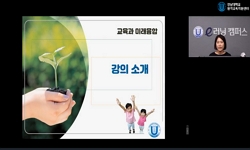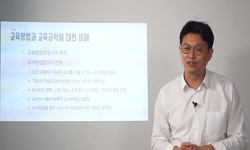This study has started based on assumptions that the creativity is one of core competencies relevant for a sustainable future and that environmental project-based learning activities can provide high school students opportunities to improve their crea...
http://chineseinput.net/에서 pinyin(병음)방식으로 중국어를 변환할 수 있습니다.
변환된 중국어를 복사하여 사용하시면 됩니다.
- 中文 을 입력하시려면 zhongwen을 입력하시고 space를누르시면됩니다.
- 北京 을 입력하시려면 beijing을 입력하시고 space를 누르시면 됩니다.
https://www.riss.kr/link?id=A100260349
- 저자
- 발행기관
- 학술지명
- 권호사항
-
발행연도
2014
-
작성언어
Korean
- 주제어
-
KDC
539
-
등재정보
KCI등재
-
자료형태
학술저널
-
수록면
534-548(15쪽)
-
KCI 피인용횟수
7
- DOI식별코드
- 제공처
-
0
상세조회 -
0
다운로드
부가정보
다국어 초록 (Multilingual Abstract)
This study has started based on assumptions that the creativity is one of core competencies relevant for a sustainable future and that environmental project-based learning activities can provide high school students opportunities to improve their creativity. The purpose of this study is to examine the changes in highschool students’ creativity through environmental project-based learning activities experienced as part of the high school environmental curriculum. Environmental project-based learning activities were conducted for 5 months in one class of 35 high school students. A mixed-methods research was used to evaluate changes in creativity. For quantitative analysis, the Torrance Tests of Creative Thinking (TTCT) was administered four times. For qualitative analysis, interviews with the students were conducted. The results of the analysis are as follows. First, the examination of changes in creativity of the students showed that components of creativity have significantly increased during their learning processes. It showed statistically significant differences in creative thinking components such as fluency, elaboration, imagination, sensitivity and creative tendency components such as inquisitiveness, aggressiveness, and curiosity. Thus it can be concluded that environmental project-based learning activities have potentials for improving students’ creativity when they explore real-world environmental issues and participate in practical environmental activities as part of their classroom environmental projects. It also supports the idea that the high school ‘Environment’ curriculum is educationally meaningful since it plays an important role in education for creativity.
목차 (Table of Contents)
- ABSTRACT
- Ⅰ. 서론
- Ⅱ. 이론적 고찰
- Ⅲ. 연구 방법 및 절차
- Ⅳ. 연구 결과 및 논의
- ABSTRACT
- Ⅰ. 서론
- Ⅱ. 이론적 고찰
- Ⅲ. 연구 방법 및 절차
- Ⅳ. 연구 결과 및 논의
- Ⅴ. 결론 및 제언
- 참고문헌
참고문헌 (Reference)
1 이성희, "환경과 녹색성장 프로젝트 활동에 따른 교사용 평가 기준 개발과 적용" 한국환경교육학회 24 (24): 32-40, 2011
2 곽홍탁, "환경' 프로젝트 학습활동이 초등학생의 자기환경화에 미치는 효과" 한국환경교육학회 18 (18): 45-58, 2005
3 오미경, "프로젝트 학습에서 성별 및 진로에 따른 모둠구성이 프로젝트 완성도에 미치는 영향 : 고등학교 환경수업 중심으로" 공주대학교 교육대학원 2012
4 손미희, "친환경학교 가꾸기 프로젝트 활동이 중학생의 환경 인식에 미치는 영향" 한국환경교육학회 24 (24): 34-43, 2011
5 강종표, "초등 실과교육에서 환경친화적 에너지 교육과 창의성 증진을 위한 교수-학습 자료 개발과 그 적용에 관한 연구" 한국실과교육학회 16 (16): 1-20, 2003
6 유동현, "초·중등학생 대상 프로젝트법의 효과에 대한 메타분석" 한국교원대학교 대학원 2013
7 교육과학기술부, "창의와 배려의 조화를통한 인재 육성: 창의․인성 교육 기본방안" 교육과학기술부 2009
8 강신경, "창의성의 영역 일반성 : 창의적 능력 및 창의적 인성과 지능의 관계" 전북대학교 대학원 2010
9 허경철, "창의성 평가 척도 개발을 위한 기초 연구" 한국교육과정평가원 2004
10 김명철, "창의성 측정 도구 고찰" 26 : 43-75, 2007
1 이성희, "환경과 녹색성장 프로젝트 활동에 따른 교사용 평가 기준 개발과 적용" 한국환경교육학회 24 (24): 32-40, 2011
2 곽홍탁, "환경' 프로젝트 학습활동이 초등학생의 자기환경화에 미치는 효과" 한국환경교육학회 18 (18): 45-58, 2005
3 오미경, "프로젝트 학습에서 성별 및 진로에 따른 모둠구성이 프로젝트 완성도에 미치는 영향 : 고등학교 환경수업 중심으로" 공주대학교 교육대학원 2012
4 손미희, "친환경학교 가꾸기 프로젝트 활동이 중학생의 환경 인식에 미치는 영향" 한국환경교육학회 24 (24): 34-43, 2011
5 강종표, "초등 실과교육에서 환경친화적 에너지 교육과 창의성 증진을 위한 교수-학습 자료 개발과 그 적용에 관한 연구" 한국실과교육학회 16 (16): 1-20, 2003
6 유동현, "초·중등학생 대상 프로젝트법의 효과에 대한 메타분석" 한국교원대학교 대학원 2013
7 교육과학기술부, "창의와 배려의 조화를통한 인재 육성: 창의․인성 교육 기본방안" 교육과학기술부 2009
8 강신경, "창의성의 영역 일반성 : 창의적 능력 및 창의적 인성과 지능의 관계" 전북대학교 대학원 2010
9 허경철, "창의성 평가 척도 개발을 위한 기초 연구" 한국교육과정평가원 2004
10 김명철, "창의성 측정 도구 고찰" 26 : 43-75, 2007
11 이동원, "창의성 교육의 실천적 접근" 교육과학사 2009
12 김영채, "창의력의 영역 보편성과 특수성: 쟁점과 TTCT 창의력 검사의 분석" 대한사고개발학회 8 (8): 1-29, 2012
13 최경수, "창의·인성 교육을 위한 가정과 프로젝트 교수·학습안 개발 및 효과 - ‘주거 공간 활용’ 단원을 중심으로-" 한국가정과교육학회 25 (25): 1-19, 2013
14 최인수, "유아의 창의성 측정도구에 관한 고찰" 20 (20): 139-166, 2000
15 노희찬, "실과 프로젝트 수업에 관한 질적 탐구" 한국실과교육연구학회 17 (17): 313-336, 2011
16 이용구, "수학교육에서의 창의적 문제해결력과 환경가치관의 함양을 위한 프로젝트 수업 연구" 한국교원대학교 교육대학원 2008
17 이승해, "미래문제해결프로그램(FPSP)을 적용한 친환경 의생활 수업이 창의·인성 함양에 미치는 영향 : 고등학교 1학년 기술·가정 '가정생활 문화' 단원을 중심으로" 한국교원대학교 교육대학원 2012
18 이혜진, "모둠 구성 및 주제 선정 방식이 환경 프로젝트 완성도에 미치는 영향" 공주대학교 교육대학원 2012
19 최돈형, "고등학교 ‘환경과 녹색성장’ 교과서" 미래엔 2011
20 김영채, "개정4판 TORRANCE 창의력 검사 TTCT(도형) B형 검사요강" 창의력 한국FPSP 2010
21 김영채, "개정4판 TORRANCE 창의력 검사 TTCT(도형) A형 검사요강" 창의력 한국FPSP 2010
22 Guilford, J. P., "Traits of creativity. Creativity and Its Cultivation" 142-161, 1959
23 Torrance, E. P., "Torrance Tests of Creative Thinking" Personnel Press 1968
24 Jellen, H. G., "The TCT-DP(Test for Creative Thinking-Drawing Production) : An instrument that can be applied to most age and ability groups" 11 (11): 138-155, 1986
25 Katz, L., "Engaging Children's Minds: The Project Approach" Greenwood Publishing Group 2000
26 임선하, "DESK 모형을 통한 창의성 교육자료 개발법" 8 (8): 105-133, 1998
27 이종현, "<재활용>프로젝트 학습을 통한 초등학생들의 환경 인식과 태도의 변화" 대구교육대학교 교육대학원 2010
28 김주훈, "2009 개정 교육과정에 따른 환경과 녹색성장과 성취기준 및 성취수준 개발 연구" 교육과학기술부․충청남도교육청 2012
29 교육과학기술부, "2009 개정 교육과정 초․중등학교 교육과정 총론(교육과학기술부 고시 제2009-41호)"
30 교육과학기술부, "2009 개정 교육과정 고등학교 환경과 녹색성장 교육과정 해설서" 교육과학기술부 2009
동일학술지(권/호) 다른 논문
-
- 한국환경교육학회
- 김희경(Heekyung Kim)
- 2014
- KCI등재
-
초·중등학교 지속가능발전교육(ESD)에 대한 인식 및 현장학교에서 ESD를 위한 관리자와 교사의 학교평가 차이 분석
- 한국환경교육학회
- 손연아(Yeon-A Son)
- 2014
- KCI등재
-
국립수목원 수생식물 전시 효과 향상을 위한 방문자 만족도 및 요구도 조사
- 한국환경교육학회
- 이정희(Chunghee Lee)
- 2014
- KCI등재
-
초등학교 5, 6학년 사회 및 과학 교과서의 기후 변화 교육 내용 분석
- 한국환경교육학회
- 박선영(Sun-Young Park)
- 2014
- KCI등재
분석정보
인용정보 인용지수 설명보기
학술지 이력
| 연월일 | 이력구분 | 이력상세 | 등재구분 |
|---|---|---|---|
| 2026 | 평가예정 | 재인증평가 신청대상 (재인증) | |
| 2020-01-01 | 평가 | 등재학술지 유지 (재인증) |  |
| 2017-05-10 | 학회명변경 | 영문명 : 미등록 -> The Korean Society for Environmental Education |  |
| 2017-01-01 | 평가 | 등재학술지 유지 (계속평가) |  |
| 2013-01-01 | 평가 | 등재학술지 유지 (등재유지) |  |
| 2010-01-01 | 평가 | 등재학술지 유지 (등재유지) |  |
| 2009-08-28 | 학술지명변경 | 외국어명 : Journal of Korean Society for Environmental Education -> Korean Journal of Environmental Education |  |
| 2007-01-01 | 평가 | 등재학술지 선정 (등재후보2차) |  |
| 2006-01-01 | 평가 | 등재후보 1차 PASS (등재후보1차) |  |
| 2005-04-27 | 학술지등록 | 한글명 : 환경교육외국어명 : Journal of Korean Society for Environmental Education |  |
| 2005-01-01 | 평가 | 등재후보학술지 유지 (등재후보1차) |  |
| 2003-07-01 | 평가 | 등재후보학술지 선정 (신규평가) |  |
학술지 인용정보
| 기준연도 | WOS-KCI 통합IF(2년) | KCIF(2년) | KCIF(3년) |
|---|---|---|---|
| 2016 | 0.94 | 0.94 | 0.99 |
| KCIF(4년) | KCIF(5년) | 중심성지수(3년) | 즉시성지수 |
| 0.98 | 0.92 | 0.94 | 0.36 |





 ScienceON
ScienceON DBpia
DBpia




